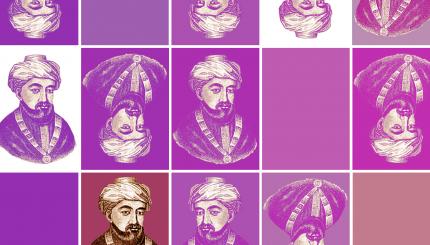Maimonides, popularly known as Rambam, was born on March 30, 1135. Maimonides is best known as a philosopher, prolific author and jurist: the foremost intellect of Medieval Judaism. Although his chapter on health in his Mishneh is still popular and studied today, most people are unaware that Maimonides actually wrote 10 medical works.
His fame as a physician spread rapidly in his later years. He became the court physician to the famous Sultan Saladin, and later to his son Al-Afḍal. In 1477, only a few years after the invention of printing, a Latin edition of his “Regimen of Health” was published in Florence. It was the first medical book to appear in print there. Prof. Waldmer Schweiseheimer, a mid-twentieth century historian, said of Maimonides’ medical writings: “Maimonides’ medical teachings are not antiquated at all. His writings are astonishingly modern in tone and content.” Mr. David Ben-Gurion, the first Prime Minister of Israel, and after him Prof. Albert Einstein, requested that Maimonides’ medical writings be published. As Sir William Osler so aptly put it, “Maimonides was Prince of Physicians.”
My journey began when I researched and wrote a book called
The Life-Transforming Diet
, published by Feldheim. This book is based on Maimonides’ nutritional and psychological advice found in his philosophical and legal works, especially his medical writings. The book was well received and is currently in its seventh printing. It has been translated into Hebrew. The Life-Transforming Diet has already produced dramatic life-changing results for thousands of people worldwide.
After the book was published, I pursued my interest in the herbal aspect of Rambam’s writings. Besides writing about nutritional and lifestyle habits, Rambam details herbal remedies extensively in his medical works. In fact, he has one dedicated thick volume about drug names and descriptions. I was especially fascinated by Maimonides’ favorite stress relief formula, which he describes: “This should be taken regularly, at all times. Its effects are that sadness and anxieties disappear. This is a remedy of which no equal can be found in gladdening, strengthening and invigorating the psyche. It should always be found in your possession.” (Maimonides Medical Writings)
At the same time, I researched the best herbal ingredients for an appetite suppressant based on Maimonides’ nutritional suggestions and the most current herbal scientific research.
My first concern was to ensure that the herbal ingredients and formulations found in Maimonides’ works were being translated accurately. In general, many translations of ancient texts are not accurate. In fact, some of the better-known translations of Maimonides’ medical works, which were originally written in Arabic, are not precise and this becomes an important issue especially regarding locating and defining the exact herbal ingredients. The first step was to find the most exact translation. I utilized all three main translations of his medical works and after months of searching, I succeeded in communicating with the most renowned expert in the translation of Maimonides’ works from the original Arabic and other manuscripts of that era. He is affiliated with Brigham Young University in the USA and proficient in classical and Semitic languages.
My next step was to actually travel to India, which I did twice. I went to New Delhi and Mumbai in order to meet current day experts in Unani Medicine. I provided them with the original Arabic manuscripts and they confirmed the exact translation of the various herbal ingredients.
I wanted to further confirm my findings in India and so I got research scientists and current day herbalists to test and confirm the ingredients and formulations.
The next step was to ensure that the formulations could be made kosher. This was actually a much bigger challenge then it seems. It took two years to make this a possibility. To make the formulations one needs the actual ingredients to be sourced kosher and the actual encapsulation needs to be supervised.
I traveled to China to the CPHI conference, which hosts 2,200 exhibitors and 29,000 attendees from over 133 countries. It is the market leader for the global pharmaceutical ingredients industry. I also visited various facilities in Shanghai and India—New Delhi, Mumbai and Ahmedabad.
After much research, I concluded that the best location for ensuring quality and strict kosher supervision of the production line was to have the products made in the USA. Since all products are also Kosher Star K certified, there is additional assurance of quality and third party substantiation of included ingredients and encapsulation.
The Visiting Scribes series was produced by the Jewish Book Council‘s blog, The Prosen People.
The Jewish world is full of debates. Get the latest in MyJewishLearning’s weekly blogs newsletter.


